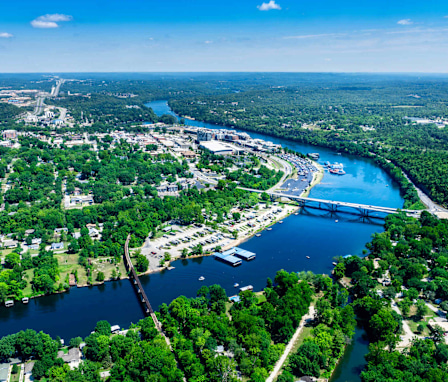The Top Nursing Programs in Missouri for Nurse Practitioners
 Credit: JeremyMasonMcGraw.com / Moment / Getty Images
Credit: JeremyMasonMcGraw.com / Moment / Getty ImagesNurse practitioner (NP) programs in Missouri prepare you for specialty roles in which you provide care to the state’s most vulnerable groups, including children, the elderly, and people with mental health conditions.
Explore this guide on what to look for in a nursing school, the top nursing programs in Missouri for NPs, and how to get started in this advanced and rewarding nursing career.
Explore the Best Missouri Online Nurse Practitioner Programs
Maryville University of Saint Louis
Saint Louis, MO
- 4 year
- Campus + Online
The Religious of the Sacred Heart founded Maryville University in 1872. Today, the institution's enrollment exceeds 10,000 students representing almost 60 countries, including around 6,000 online learners. Maryville University holds accreditation from the Higher Learning Commission.
The institution's 47-credit online master of science - family nurse practitioner program includes asynchronous courses on policy, leadership, and pharmacotherapeutics. Students also complete several clinical experiences totaling 745 hours. Graduates are prepared to provide patients of all ages with holistic care.
Maryville University also offers an online doctorate with a family nurse practitioner specialization.
- Campus: St. Louis, Missouri
- Type: Private
- Accreditation: Commission on Collegiate Nursing Education
- Tuition: $813/credit
- Admission Requirements: Bachelor of science in nursing; minimum 3.0 GPA; RN license and 12 months of relevant experience; recommendations; resume or CV; essay
- Minimum Time Commitment: Four semesters
- On-Campus Requirements: No
- Program: Master of science in nursing - family nurse practitioner
- In-State$24,766
- Out-of-state$24,766
- In-State$14,346
- Out-of-state$14,346
- Retention Rate82%
- Acceptance Rate92%
- Students Enrolled10,596
- Institution TypePrivate
- Percent Online Enrollment84%
- AccreditationYes
Cox College
Springfield, MO
- 4 year
- Campus + Online
Cox College started in 1907 as Burge Deaconess Training School for Nurses with only three learners. As of Spring 2019, the school enrolled around 900 students. The college holds accreditation from the Higher Learning Commission.
Cox College's master of science in nursing - family nurse practitioner program comprises 42 credits. The curriculum includes eight- and 16-week classes covering nurse practitioner roles, ethical field concerns, and pharmacology. Students also complete 660 hours of clinical experience, in which they care for children, women, adults, and the elderly.
Graduates are qualified to sit for family nurse practitioner certification examinations.
- Campus: Springfield, Missouri
- Type: Private
- Accreditation: Accrediting Commission for Education in Nursing
- Tuition: $600/credit
- Admission Requirements: Bachelor of science in nursing; minimum 3.0 GPA preferred; RN license; CV; two recommendation letters; essay
- Minimum Time Commitment: 24 months
- On-Campus Requirements: Yes
- Program: Master of science in nursing - family nurse practitioner
- In-State$10,080
- Out-of-state$10,080
- In-State$10,800
- Out-of-state$10,800
- Retention Rate50%
- Acceptance Rate39%
- Students Enrolled956
- Institution TypePrivate
- Percent Online Enrollment99%
- AccreditationYes
University of Central Missouri
Warrensburg, MO
- 4 year
- Campus + Online
Located in Warrensburg, UCM began in 1871. The university has since grown to serve over 12,000 learners, with 97% of alumni working or entering other programs within six months of graduation. The school holds accreditation from the Higher Learning Commission.
The university's master of science in nursing program offers a concentration in family nurse practitioner concepts. Degree candidates complete 44 credits, taking classes in leadership, policy, and pharmacology. The program culminates in a capstone experience consisting of clinical hours.
Candidates may study on a part- or full-time basis. All learners must earn a minimum grade of "C" in each course to continue the program without interruption.
- Campus: Warrensburg, Missouri
- Type: Public
- Accreditation: Commission on Collegiate Nursing Education
- Tuition: $365.90/credit
- Admission Requirements: Bachelor's in nursing; minimum 3.0 GPA; RN license and 12 months of experience
- On-Campus Requirements: No
- Program: Master of science in nursing - family nurse practitioner
- In-State$8,040
- Out-of-state$16,080
- In-State$8,136
- Out-of-state$16,272
- Retention Rate71%
- Acceptance Rate71%
- Students Enrolled11,637
- Institution TypePublic
- Percent Online Enrollment51%
- AccreditationYes
University of Missouri-Kansas City
Kansas City, MO
- 4 year
- Campus + Online
UMKC opened with 260 learners in 1933. Today, the university boasts more than 16,000 students and over 126,000 graduates. Current enrollment represents over 85 countries. UMKC is a public institution with accreditation from the Higher Learning Commission.
The School of Nursing and Health Sciences offers a master of science (MSN) in nursing program with a family nurse practitioner track. Learners complete 47 credits that cover topics like health assessment, pharmacology, and diagnostic reasoning, along with clinical institutes that mandate on-campus visits. The program may prepare learners for certification exams through the American Association of Nurse Practitioners or the American Nurses Credentialing Center.
- Campus: Kansas City, Missouri
- Type: Public
- Accreditation: Commission on Collegiate Nursing Education
- Tuition: $600/credit for resident and graduate metro students; $900/credit for Midwest exchange; $1,142 for nonresident students
- Admission Requirements: Bachelor of science in nursing; minimum 3.2 GPA; nursing license; interview; prerequisite coursework in statistics and health assessment
- On-Campus Requirements: Yes
- Program: Master of science in nursing - family nurse practitioner
- In-State$9,840
- Out-of-state$27,660
- In-State$10,660
- Out-of-state$27,521
- Retention Rate77%
- Acceptance Rate69%
- Students Enrolled15,715
- Institution TypePublic
- Percent Online Enrollment44%
- AccreditationYes
 How We Rank Schools
How We Rank Schools
We use a data-driven methodology to rank the best NP programs in Missouri, making it easier for you to find a program that works for you. Our methodology is based on metrics that we believe matter most to students, including academic quality, affordability, reputation, and program offerings. This list was developed in 2021.
Steps to Become a Nurse Practitioner in Missouri
Nurse practitioner programs in Missouri prepare students for careers as primary health care providers (similar to the role of a physician). Before enrolling in NP school, applicants must choose a specialty (i.e., family practice, pediatric care, women’s health, geriatric health, acute care, or mental health).
The road to becoming an NP in Missouri can take up to 6-8 years and includes:
- Completing an RN program and earning an undergraduate nursing degree
- Working as an RN for at least one year
- Completing an NP program and earning a master of science in nursing (MSN) or doctor of nursing practice (DNP)
- Obtaining an NP license
While program length may be longer or shorter depending on degree program and specialty, NP programs take about 2-4 years to complete.
Why Is NP Program Accreditation Important?
Choosing an accredited nursing program in Missouri is important because it increases the likelihood graduates will be adequately prepared for an RN or advanced practice registered nurse (APRN) role. Nursing school accreditation proves a nursing program meets specific educational standards established by accrediting bodies, such as the Accreditation Commission for Education in Nursing (ACEN) and the Commission on Collegiate Nursing Education (CCNE).
Accredited NP schools in Missouri undergo rigorous evaluations to ensure graduates have a high chance of meeting specialty role competencies and passing the NP state board exam. Accreditation also makes candidates eligible for financial aid and gives them the ability to transfer course credits to other accredited schools.
All Missouri NP programs in our rankings are accredited.
Frequently Asked Questions About Online Nurse Practitioner Programs in Missouri
Becoming an NP in Missouri can take up to 6-8 years. This includes 2-4 years of undergraduate nursing study, one year of RN experience, and 2-4 years of NP school. Program length can vary based on specialty, enrollment status, and whether you are pursuing an MSN or DNP.
More Nursing Resources

The Best Online Nurse Practitioner Programs of 2025
Nurse practitioners are in high demand. Discover the best online nurse practitioner programs to advance your career and increase your earning potential.

Nurse Practitioner Job and Salary Outlook 2025: By the Numbers
Nurse practitioner jobs are in high demand. Discover NP salary and job data, including the highest-paying specialties and locations.

Top Missouri Nursing Schools and Programs
Nurses are in high demand in Missouri. Learn about Missouri’s top nursing programs and nurse licensing, typical salaries, and job outlook.